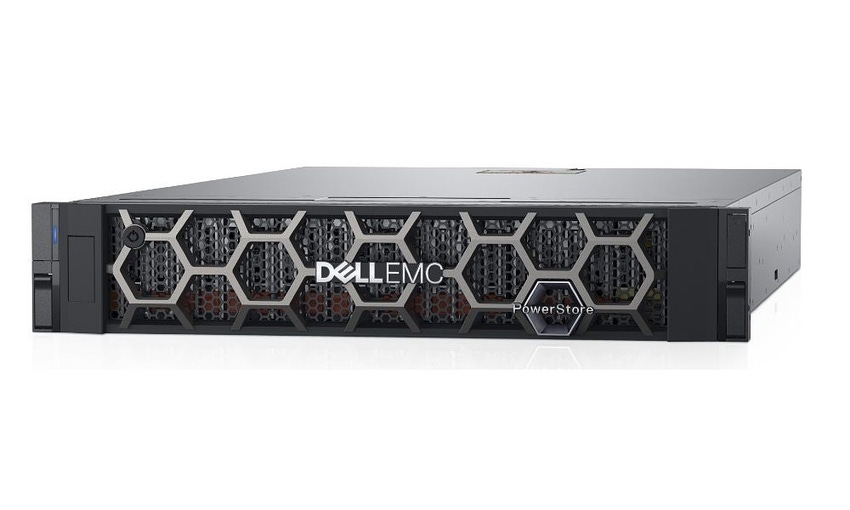The Dell EMC PowerStore platform helps the company better serve the midrange market.
May 5, 2020

With its new Dell EMC PowerStore midrange storage platform, Dell has launched its NEXT strategy in midrange data storage.
The PowerStore platform can be up to seven times faster than previous Dell EMC midrange storage arrays. The systems include all new designs from the ground up to give increased performance, according to Dell.
Built for any workloads, PowerStore includes a scale-out architecture for block, file and VMware Virtual Volumes (vVols). To provide that performance, PowerStore is built around NVMe all-flash memory and dual port Intel Optane SSDs.
Also included are machine learning and intelligent automation capabilities to give faster application delivery and services with less staff intervention.
Other features include Dell EMC CloudIQ storage monitoring and analytics for real-time performance and capacity analysis and historical tracking. A programmable infrastructure streamlines application development and provides VMware integration and support for platforms including Kubernetes, Ansible and VMware vRealize Orchestrator.
PowerStore also includes AppsON, which is a built-in VMware ESXi Hypervisor where administrators can deploy apps directly on the array. That provides greater flexibility and is built to handle data-intensive workloads in core or edge locations and infrastructure applications.
Built-in tools simplify the migration of entire data stores to new locations in fewer than 10 clicks, according to Dell.
In addition, Dell Technologies On Demand allows customers to respond to workload spikes and new service requests with elastic capacity as needed. Customers can choose flexible, pay-per-use consumption models with short- or long-term commitment options for their data storage.
The Dell EMC Future-Proof Program covers the PowerStore platforms, so customers can get anytime upgrades when they need them.
You can connect PowerStore to all major public clouds including Amazon Web Services, Azure and Google Cloud, as managed services.
Answering Partners’ Call

Dell’s Scott Millard
“Our partners played an active role in developing these new offerings,” Scott Millard. told Channel Futures. Millard is senior vice president of global channel data center sales at Dell Technologies. “PowerStore combines all the best features our partners have been asking for from across our current midrange product lines.”
The new storage line will help partners support growing customer requirements as it also helps grow revenue, he said.
“It qualifies for all existing Dell Technologies partner program incentives, including tech refresh, competitive swap, partner preferred and others. Also, our partner marketing team has many, many virtual partner enablement activities scheduled in May.”
Partners and customers will be able to take advantage of several flexible financing options for the new products, said Millard. That includes Flex On Demand or through Dell Financial Services for midrange data storage.
“This is the most important and differentiated product launch I’ve seen in my 20 years in the storage industry,” said Millard. “The opportunity in front of partners is huge. The worldwide storage market is an estimated $28.5 billion this year and midrange is the largest and fastest growing portion.”
Jerrod Janes is vice president of technical presales for Dell EMC partner and reseller, SHI. He said the new offering’s midrange pricing and all-flash design hit a sweet spot in the market.

SHI’s Jerrod Janes
“Before PowerStore, Dell Technologies was already the market leader in midrange. But we are all hoping that this marks a start toward consolidation of the portfolio,” said Janes.
The new systems will help partners assist customers who want simplified data storage management and flexibility, said Janes.
“Dell was very engaged with partners in the development of PowerStore,” he said. “PowerStore combines all the best features partners have been asking for from across current product lines.”
Eric Burgener, a storage analyst with IDC, said the move to NVMe instead of SCSI was a good call. It gets more done with …
… systems and drives better balance in price and performance.

IDC’s Eric Burgener
“It’s also the protocol of the future for primary storage. So for a new PowerStore customer, there’s no forklift upgrade to move to newer storage technologies like persistent memory, storage class memory or NVMe over fabrics.” said Burgener. “This is Dell EMC bringing NVMe to midrange storage, although Hitachi, IBM and Pure Storage had already done that.”
The AppsON option is PowerStore’s other important ingredient, said Burgener.
“This effectively lets customers run applications directly on PowerStore, instead of running them on separate servers in what they call ‘hypervisor mode.’”
That’s not really a traditional hyperconverged infrastructure system, but it brings some of those same benefits in terms of infrastructure consolidation and can be particularly interesting in edge or distributed environments to lower footprints and costs, he said.
Scott Sinclair of Enterprise Strategy Group is another analyst. He said the new storage systems feature impressive innovation and a few additional capabilities that can dramatically simply IT storage environments. They also improve application deployment flexibility.
“For channel partners, PowerStore simplifies the conversation and the upfront storage design work, providing end-to-end NVMe performance with the ability to scale up, adding more capacity, or out, adding performance and capacity, as demands evolve,” said Sinclair. “This increased performance and flexibility should offer channel partners an opportunity to shorten deployment schedules with their clients. It should also increase the opportunities and options on how to advise clients to grow their storage environments moving forward.”
Read more about:
VARs/SIsAbout the Author(s)
You May Also Like


